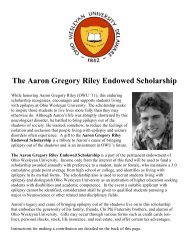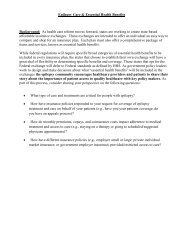Legal Rights of Children with Epilepsy in School & Child Care
Legal Rights of Children with Epilepsy in School & Child Care
Legal Rights of Children with Epilepsy in School & Child Care
Create successful ePaper yourself
Turn your PDF publications into a flip-book with our unique Google optimized e-Paper software.
<strong>Legal</strong> <strong>Rights</strong> <strong>of</strong> <strong><strong>Child</strong>ren</strong> <strong>with</strong> <strong>Epilepsy</strong> <strong>in</strong> <strong>School</strong> and <strong>Child</strong> <strong>Care</strong><br />
Exhaustion <strong>of</strong> Adm<strong>in</strong>istrative Remedies:<br />
Frazier v. Fairhaven <strong>School</strong> Committee, 276 F.3d 52, 60-61 (1 st Cir. 2002)<br />
A party must exhaust all avenues <strong>of</strong> adm<strong>in</strong>istrative review regardless <strong>of</strong> whether the<br />
adm<strong>in</strong>istrative process <strong>of</strong>fers the particular type <strong>of</strong> relief that is be<strong>in</strong>g sought. There are a<br />
number <strong>of</strong> benefits to exhaustion: the educational agency can develop a factual record,<br />
apply its expertise to the problem, and exercise its discretion and correct its own<br />
mistakes, and the process puts educational pr<strong>of</strong>essionals <strong>with</strong> specialized knowledge at<br />
the center <strong>of</strong> the decision-mak<strong>in</strong>g process. Additionally, the adm<strong>in</strong>istrative hear<strong>in</strong>g<br />
process results <strong>in</strong> the development <strong>of</strong> a detailed evidentiary record.<br />
Polera v. Bd. <strong>of</strong> Educ., 288 F.3d 478, 488, n. 8 (2d Cir. 2002)<br />
The burden is on the party seek<strong>in</strong>g an exception to the exhaustion requirement to show<br />
the applicability <strong>of</strong> the exception.<br />
Hope v. Cort<strong>in</strong>ez, 69 F.3d 687 (2d Cir. 1995)<br />
Pla<strong>in</strong>tiffs must exhaust the IDEA’s adm<strong>in</strong>istrative procedures before br<strong>in</strong>g<strong>in</strong>g suit under<br />
the ADA to obta<strong>in</strong> relief that is available under the IDEA.<br />
Heldman v. Sobol, 962 F.2d 148 (2d Cir. 1992)<br />
Exhaustion may be excused as futile when the agency is either act<strong>in</strong>g <strong>in</strong> violation <strong>of</strong> the<br />
law or is unable to remedy the alleged <strong>in</strong>jury.<br />
Mrs. W. v. Tirozzi, 832 F.2d 748, 756 (2d Cir. 1987)<br />
Exhaustion is not an <strong>in</strong>flexible rule. Exceptions may be made to the exhaustion rule if:<br />
1) Exhaustion would be futile<br />
2) The agency has adopted a policy or has a generally applicable practice that is<br />
contrary to law<br />
3) Adequate relief is improbable through adm<strong>in</strong>istrative remedies<br />
J.G. v. Board <strong>of</strong> Educ. <strong>of</strong> Rochester City <strong>School</strong> Dist., 830 F.2d 444, 446-7 (2d Cir. 1987)<br />
Adm<strong>in</strong>istrative remedies are generally <strong>in</strong>adequate when structural, systemic reforms are<br />
sought.<br />
126








